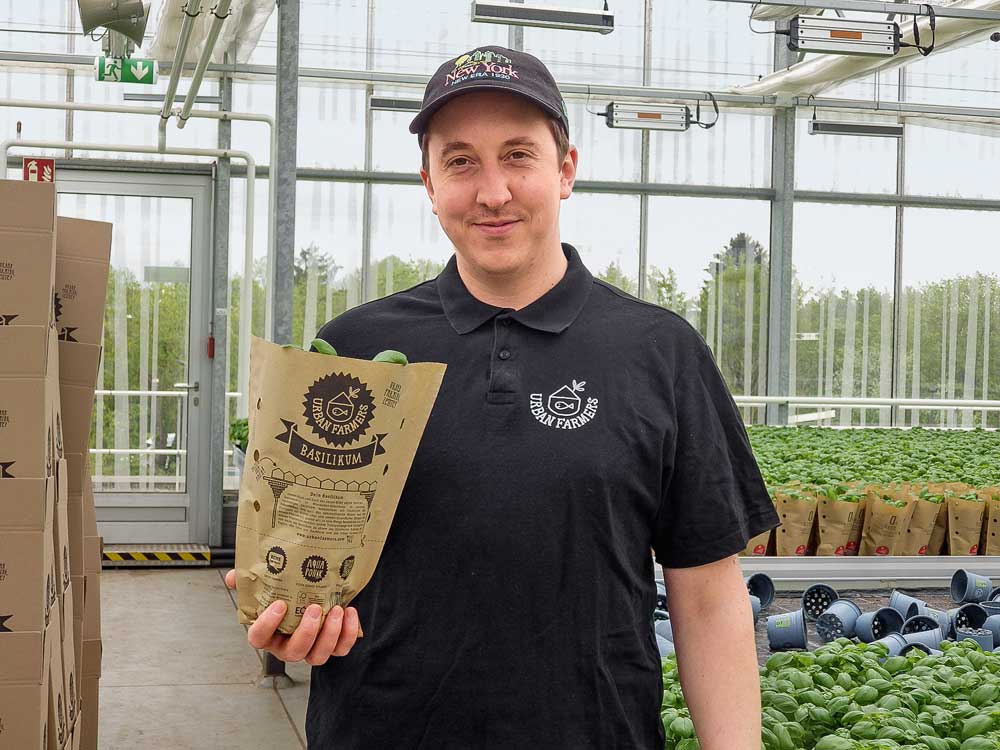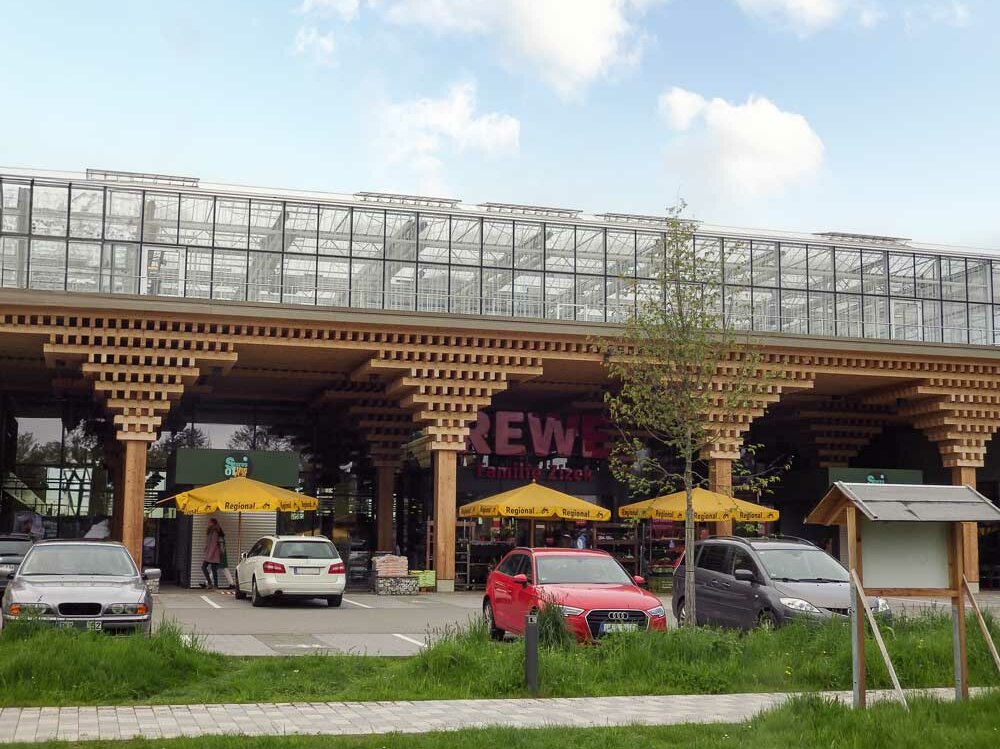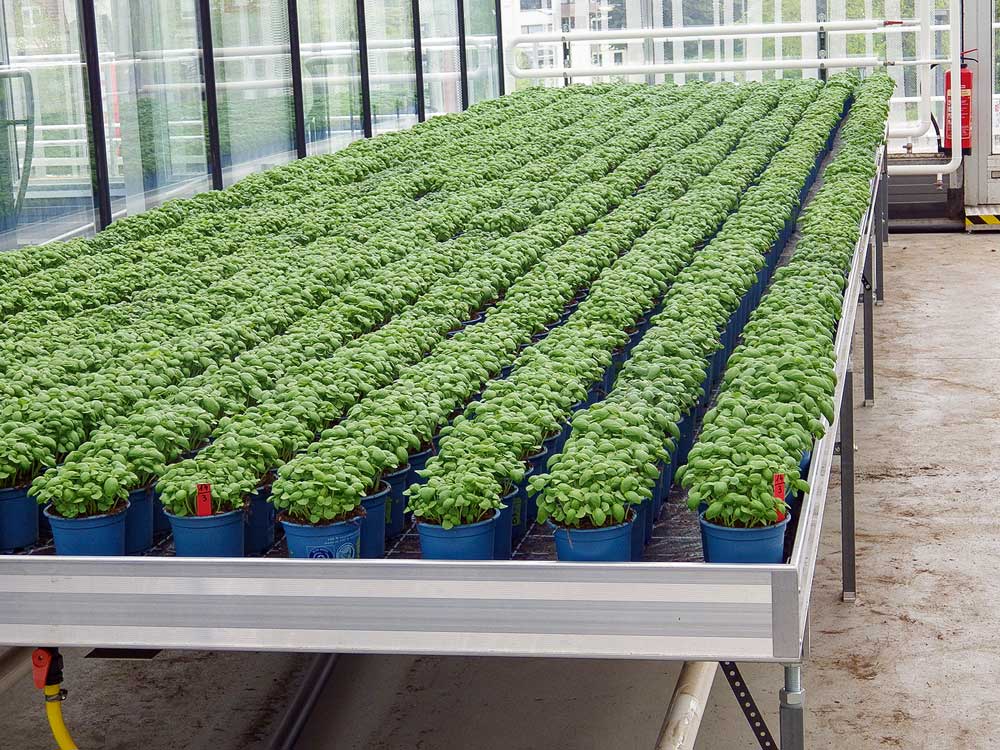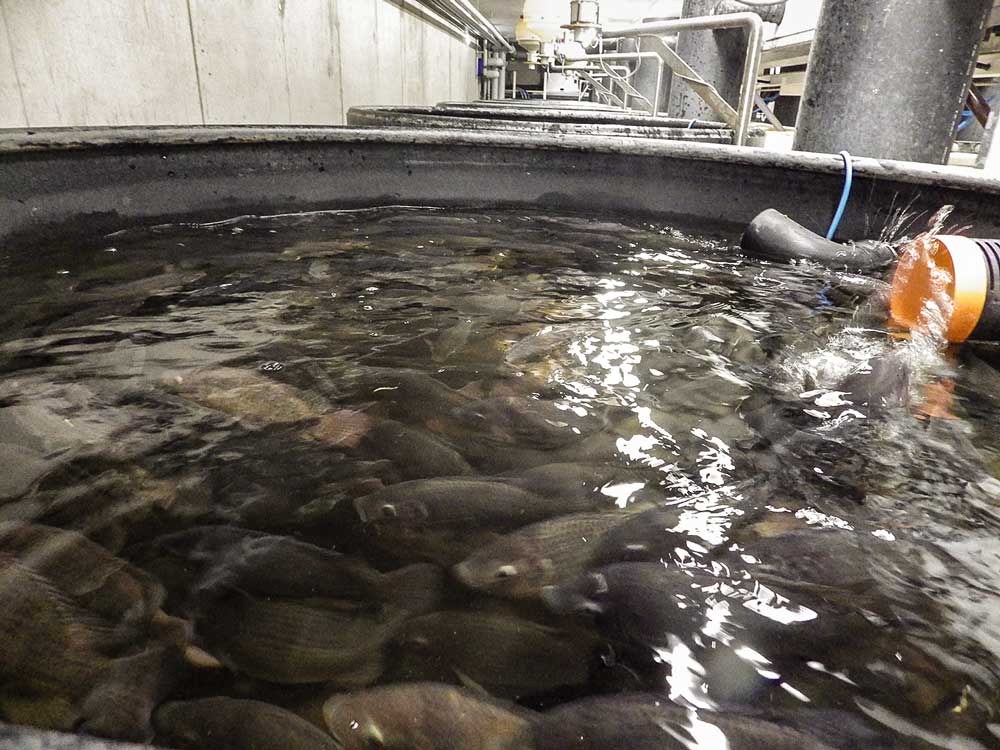Marketing: basil and fish on the supermarket roof
By Katharina Heil, DLG Mitteilungen
Producing food as close to the consumer as possible, sustainably and with the lowest possible use of resources - that is the goal of ECF Farmsystems and founder Nicolas Leschke. The subsidiary "Frisch vom Dach" produces basil and bass at the Rewe Future Market in Wiesbaden-Erbenheim.
"We produce around 800,000 pots of basil per year and around 10 tonnes of fish here," explains Jannis Grothaus, Operations Manager of Wiesbaden-based "Frisch vom Dach". He is a professional fish farmer, but has also acquired knowledge of plant production. The basil from the rooftop farm can supply 400 Rewe markets in the region. The fish is distributed to 40 markets in the surrounding area.
When you enter the greenhouse on the supermarket roof, it smells wonderfully of basil. On the floor below the greenhouse, fish production takes place in a closed system. On the ground floor, customers can shop and look up to the basil plants through the store's large atrium. The aquaponics system is designed to minimise the use of resources.
Closed production system
Rainwater is collected and used for aquaculture. Nutrients enter the water through the excretions of the fish. This enriched water is used for irrigation and fertilisation in basil production. In addition, the CO2-enriched air from fish production is channelled into the greenhouse to the plants. Waste heat from the market and the company's own CHP plant are used to regulate the temperature.
The young basil plants are produced on site. Small plastic pots are filled with soil and the seeds are added. The planted pots are placed on specially designed plant cabinets, where they remain for 14 days and are watered. They are then placed on larger planting tables with an ebb and flow system. "We control the growth depending on how close together we place the pots," explains Grothaus. "At the beginning we place them closer together, towards the end we move them further apart so that the plants grow more in width." It takes around 26 to 28 days from germination until the plants are in the shop. Before that, the plastic pots are removed and used for the next young plants. In the shop, the basil is packed in plastic-free packaging. A pot of sustainably produced herbs costs customers € 1.99. "We can largely do without plant protection here, as the cultivation period is very short," says Grothaus.
Well-organised cycle
However, production is quite labour-intensive. In addition to Grothaus, six other employees work at "Frisch vom Dach". Five of them look after the plants. A lot of manual labour is involved here, especially during harvesting, packaging and sowing. The goods that are not sold directly in the Erbenheim store are transported to the central warehouse by Rewe's own logistics system and distributed from there to other stores in the region.
Beneath the greenhouse is the aquaculture area, for which one employee is responsible. African cichlids, also known as tilapia, are grown in 13 tanks, each with 3,000 litres of water. "We have set a limit of 80 kg per m3 for the stocking density," explains Grothaus. "The fish need a certain density to form a good schooling behaviour." In the final stocking, this means around 400 to 500 fish per tank. The juvenile fish are 0.2 g seedlings that come from the parent company in Berlin. They take around eight months to grow into the 500 g slaughter-ready fish. No treatments are necessary during this time. And losses are also close to zero, says Grothaus. Feeding and water parameters are computerised and monitored around the clock. The animals are fed fully automatically three times an hour for ten hours a day. "We feed the perch a completely vegetarian diet, even though they are actually omnivorous. But this also makes them suitable for vegetarians who want to eat fish," says the farm manager. The feed is made up of European soya and cereal components. Here too, attention is paid to maximising sustainability.
As it is a tropical fish, the ambient temperature is correspondingly high at 30 °C and almost 80 % humidity. The water in the tanks is changed regularly. Fresh, oxygen-enriched water enters the tanks via an upper channel. A lower channel removes the dirty water. This is purified biologically and mechanically via a drum screen before it enters the plant production system.
The fish ready for slaughter are usually "harvested" once a week. There is a spacious slaughterhouse in the next room where the animals are slaughtered and gutted. They are then delivered whole to the Rewe markets in the region.
Further expansion planned
"For the future, we would like to further expand the concept with Rewe in Germany and, if possible, use it as a blueprint for other countries," says Nicolas Leschke, Managing Director of parent company ECF Farmsystems.
But his vision goes even further: instead of producing at the markets, Leschke would like to set up locations at the retailers' central warehouses. "That's where the logistics are organised most efficiently. That could save us an empty journey, which we currently have when we drive from the producing store to the central warehouse and from there to the other stores in the region. That would be even more sustainable and save resources," says the founder. He is thinking of much larger systems: "These could be farms of more than one hectare in which we produce several million salads and over 100 tonnes of fish, for example.
Opportunities on the international market?
Leschke sees good opportunities for international business. "Sustainable production is a hugely important topic from a global perspective. As humanity, we have to get to a point where we can produce more output with fewer resources in a smaller area. Our way of producing can contribute to this. The system is also ideal for regions that cannot supply themselves with high-quality food due to water shortages because it is extremely water-efficient." Leschke is thinking, for example, of the Emirates or other regions that currently have to fly in large quantities of food. "We can also supply people there with high-quality food at favourable prices," he says. Big visions, indeed. It will be interesting to see how things develop.






